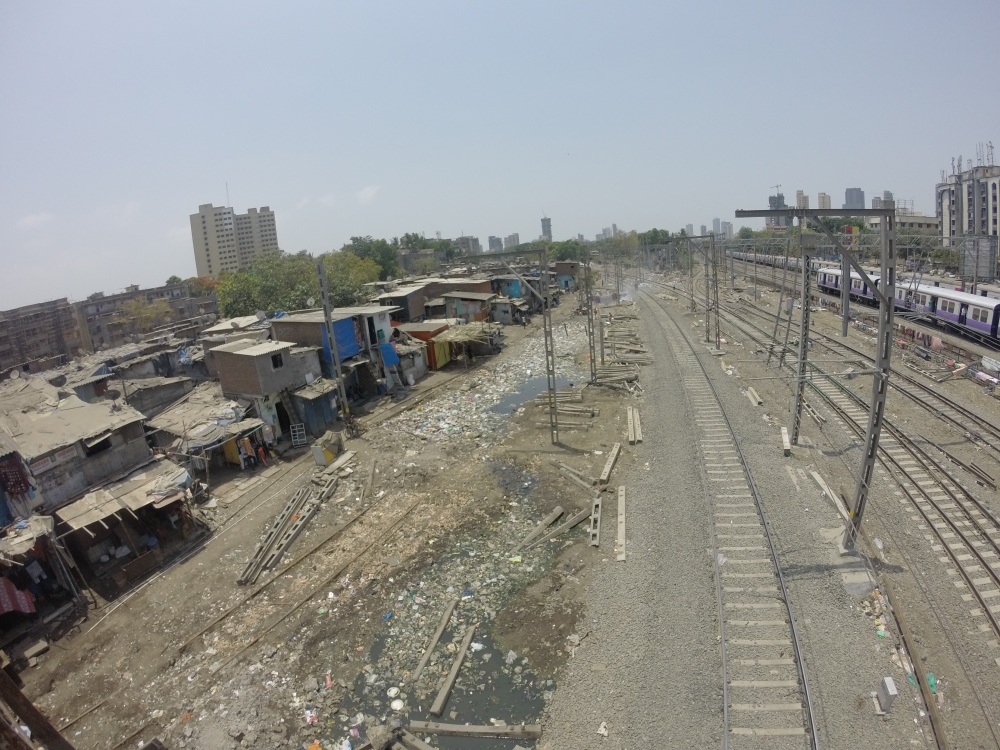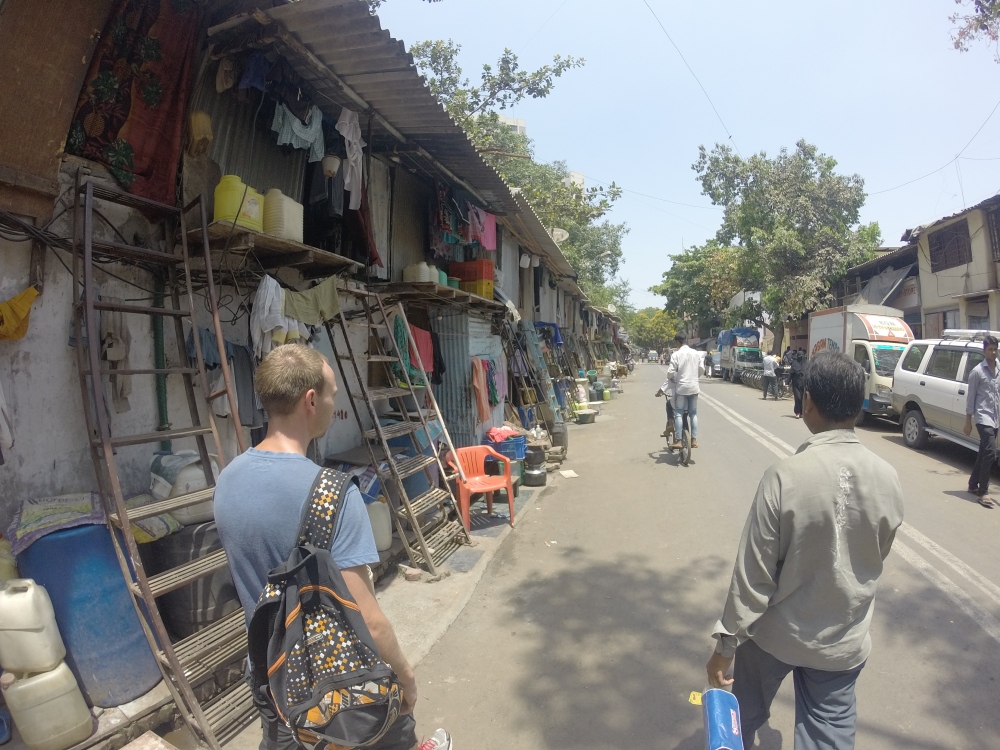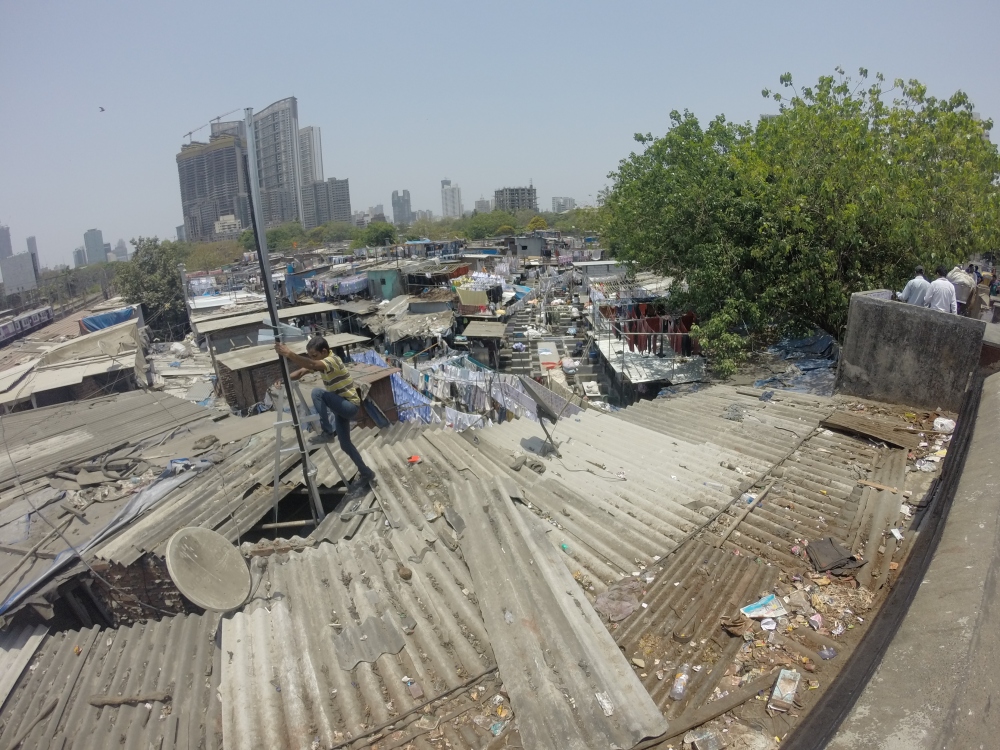Song of the day: Stretch Out and Wait by The Smiths “Amidst concrete and clay and general decay, nature must still find a way”
Our final full day in Mumbai. We took the train north from Mumbai Central to Mahim Junction. We climbed a footbridge over the tracks and from that elevated viewpoint we were able to see the undulating patchwork of corrugated roofs that make up the Dharavi Slum. Squeezed in amongst skyscrapers, flyovers and train tracks, Dharavi is a place where a million people live on top of each other within a square mile of the city. It featured heavily in the film Slumdog Millionaire, although now that we’ve been to Dharavi and seen for ourselves, I think that film paints a pretty bleak picture of a place that was in fact in a bizarre way, almost uplifting to visit.
When Luke suggested that we visit one of Mumbai’s infamous slums I was a bit apprehensive – I don’t mind being out of my comfort zone or I wouldn’t have come to India in the first place – but I was a bit worried that we’d be so alien to everything that was around us that we’d be chased away, or attacked, or robbed, or something else bad. Now that we’ve been I feel guilty for having held such a low opinion of the people who live here. My other concern was that we were going to the slum just to go on “Poverty Safari” as it’s described in the Lonely Planet. I don’t know, maybe we were, but Luke shares my curiosity for this kind of thing and I do believe that seeing places like this makes you a better rounded person.

The slum housing of Dharavi alongside the railway tracks
We came down the steps and passed a huge open wasteground where barefooted kids were playing cricket in the dust. We turned onto a long tarmac road which was lined either side with tiny two storey huts built of random materials. Many of these huts even have satellite dishes poking out of the top – not everybody living here is completely destitute, but they lack alternative housing options. The street throbbed with the usual hustle and bustle of everyday Indian life. Goats and cows of similar stature roamed as they pleased. Beautiful children with mucky faces beamed up at us, occasionally daring to offer an English greeting before running off giggling into the shadows. Some of the huts were entirely open to the street as the owners ran their businesses out of them. Cobblers, tailors, Chaiwallers, butchers, restaurants revealed not only the extent of their craftsmanship, but also the spaces where they and their families eat, sleep and pass the time of day. It’s a humbling sight to be able to fix a family of five and all of their worldly possessions with a swift glance out of the corner of your eye.

Some of the more “permanent” houses we walked past
At the end of the paved road the slum stretched itself out into dusty, unadopted side streets that existed more out of necessity than design. Thin slivers of dry mud are the corridors that seperate the serpentine rows of makeshift housing, and a million different people tramp the dirt flat as they make their way from one improbable location to another. We saw handshakes and shaking fists, smiles and sneers, laughter and tears. All of human life is here, existing and thriving in conditions that couldn’t be dreamt up in the grimmest of nightmares. If you want a monument to human endeavour – our ability to survive and endure against all odds – don’t look for it in skyscrapers or palaces or parks. Come to Dharavi.
We walked back to the station and took the train south to Mahalaxmi. Here we stood overlooking a little circle of houses, in the middle of which 1026 washing pools are situated. Hundreds of women stood soaking, rinsing, wringing and beating clothes in each of the segregated stone basins. It was one of the first times on our travels in India that the air felt sweet, fresh and clean. Clothes hung everywhere on rooftops and outside windows. On one roof a dozen or so police uniforms swayed in the mid-afternoon breeze, and I wondered how easy it’d be for a crook to pinch one and get up to all kinds of mischief dressed in the attire of the law. Owing to the lack of laundry services we’ve found on our travels, Luke and I have been handwashing our clothes using a bucket of water and a bar of detergent, with which we scrub the clothes. It’s hard work, I can tell you! Usually I’ve washed my clothes just before going for a shower myself, because the process of washing them is that intense in these hot conditions that you end up drenched in sweat. Wringing clothes out is a particularly arduous task which has left me with callouses on my fragile, unworked hands – I never thought I’d be in a position to appreciate the mangle as an invention! Our hats must go off to the ladies of Mumbai who keep the city’s laundry fresh and clean without drawing upon the luxury of a washing machine – an invention which I take all too much for granted back home.

Beyond the corrugated roofs, hundreds of washing basins at Mahalaxmi
We returned to the hostel to pack up for the following day’s transit to Bengaluru, before returning to Girgaum Chowpatty beach for a a final Bhelpuri and people-watching session. Mumbai was a bit of a slow-burner for us. That first morning we wondered what all the fuss was about, but as we’ve explored and soaked up the atmosphere here we’ve begun to appreciate the city’s importance to India. There’s no doubt that Mumbai is a city on the move – you’ve only to look at the skyline, which far outstrips London for skyscrapers. There’s also the inevitable poverty which blights such an overpopulated country, and in Mumbai the contrast between rich and poor is made all the more stark by the fact that the different classes live on top of each other – sometimes literally. Here more than anywhere else we’ve been though, you get the impression that even the destitute are on the lookout for a way to break out of that perpetual cycle of poverty. What’s that Oscar Wilde quote? “We are all in the gutter, but some of us are looking up at the stars”.
Tomorrow we fly to Bengaluru.
Have a great day, whatever your endeavour
Tommy and Lukey
Love the stories. Sounds like you are sampling the many ways of life in India..love the Oscar Wilde quote by the way x
LikeLike